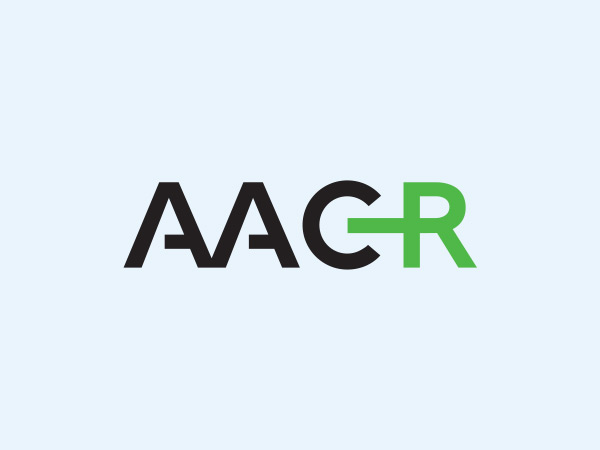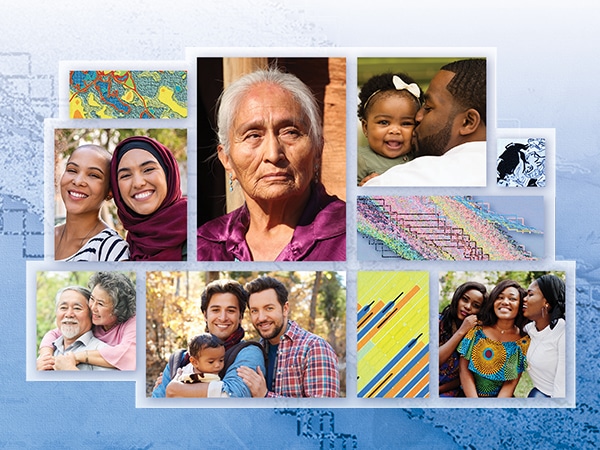Annual Meeting 2022: Welcome to New Orleans
Excitement and emotion ran high Sunday morning as Margaret Foti, PhD, MD (hc), chief executive officer of the American Association for Cancer Research (AACR), officially launched the Annual Meeting 2022 Sunday in New Orleans.
“Wow… It is so great to see all of you again in person,” Foti said. “It is amazing to be back together and to feel the excitement and energy of this meeting after three long years since we were together in Atlanta.”
After a rousing performance by the Preservation Hall All-Stars, Foti enthusiastically greeted thousands of attendees, representing dozens of disciplines in cancer science, policy, and survivorship. Foti told the crowd that more than 19,000 people have registered for Annual Meeting 2022, with about 78 percent attending in person. Annual Meeting 2022 is the largest scientific meeting to return in person since the beginning of the COVID-19 pandemic, she said.
While Foti and meeting attendees alike expressed great joy in the return to an in-person meeting, Foti noted that the virtual Annual Meetings in 2020 and 2021 played a valuable role during the pandemic, enabling the cancer community to share and discuss cutting-edge cancer research despite the obstacles presented by COVID-19.
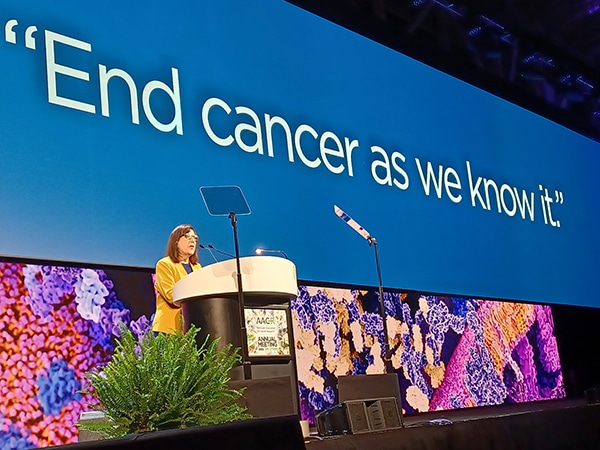
“These past two years will be forever embedded in our minds,” Foti said. “I would like to take a moment to acknowledge the leading role played by the cancer research community and our members in addressing the COVID-19 crisis while continuing to push the cancer field forward for the benefit of patients. As we start to emerge from the pandemic and now look ahead to the future, we are proud of how we have grown and what we have learned from this time.”
This year marks the 115th anniversary of the AACR, and Foti said the return to an in-person meeting is a thrilling way to kick off a year of celebrations. As she unveiled the theme for this milestone year—The AACR: The Driving Force to Eradicate Cancer—she reflected on the progress that has been made since the AACR’s founding in 1907.
“Our founders would be in absolute awe if they were able to personally experience the spectacular advances that have been made in cancer research and the tremendous growth of our organization.
“Thanks to these advances, the overall age-adjusted cancer death rates in the United States have decreased by 31 percent in the past 25 years, a reduction that translates into 3.2 million cancer deaths avoided. The mortality rate for pediatric cancers has declined by more than 50 percent from the mid-1970s, and today, the five-year survival rate for children with cancer is 85 percent,” she said.
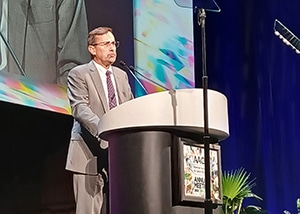
Foti acknowledged that the meeting is taking place in the midst of critical global issues, from the continuing strain of the pandemic to the war in Ukraine. AACR President David A. Tuveson, MD, PhD, FAACR, said the war is taking a devastating toll on the Ukrainian people, including cancer patients, who are facing interrupted care, loss of medical facilities, and insufficient food and supplies.
“The AACR is committed to actively engaging our networks in the United States and around the world to address this humanitarian crisis,” Tuveson said. The AACR has launched the AACR Ukraine Crisis Relief Fund; details on how to contribute are available on our website.
Tuveson also discussed the urgent need for the federal government to provide sufficient funding for cancer research through the National Cancer Institute and National Institutes of Health. Such funding is especially important for early-career researchers as they strive to make scientific breakthroughs against cancer, Tuveson said.
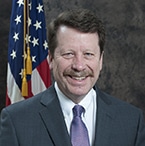
The role of the federal government was brought home by an appearance by Robert M. Califf, MD, commissioner of the U.S. Food and Drug Administration (FDA). In a video presentation, Califf said the FDA as a whole, and the FDA’s Oncology Center of Excellence in particular, will continue to work toward bringing lifesaving cancer treatments to patients everywhere. The FDA also supports the AACR’s quest to ensure that progress against cancer is shared by all Americans, no matter their racial or ethnic background or socioeconomic status, Califf noted.
As Tuveson concludes his AACR presidency, he noted several exciting initiatives under development, including many new grants programs and a task force devoted to the concept of Trust in Science. He welcomed the incoming President, Lisa M. Coussens, PhD, FAACR, who will assume the role this week at the Annual Meeting.
“It’s been a real honor to serve as your president this year, and I look forward to seeing what is to come,” Tuveson said.

